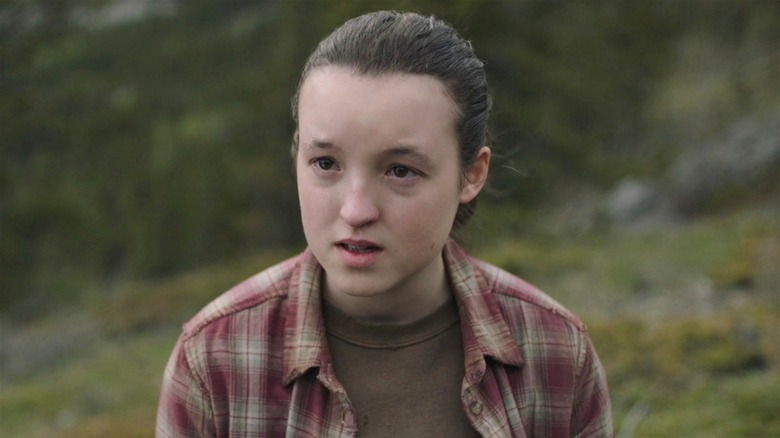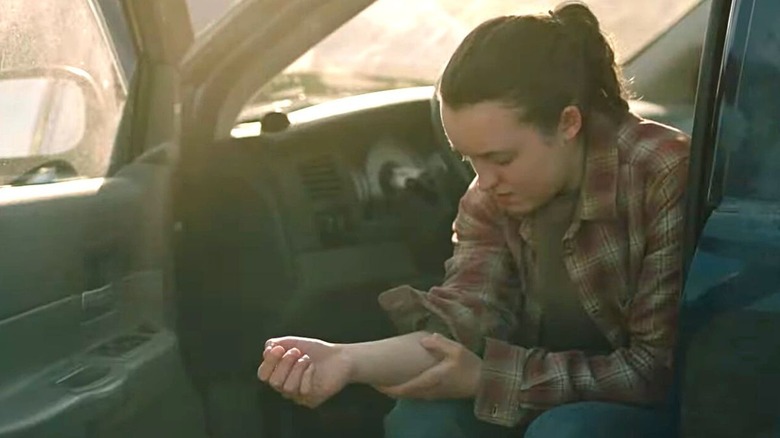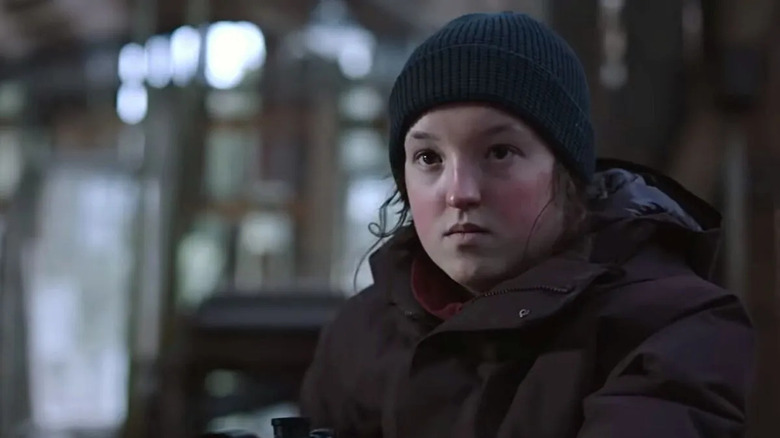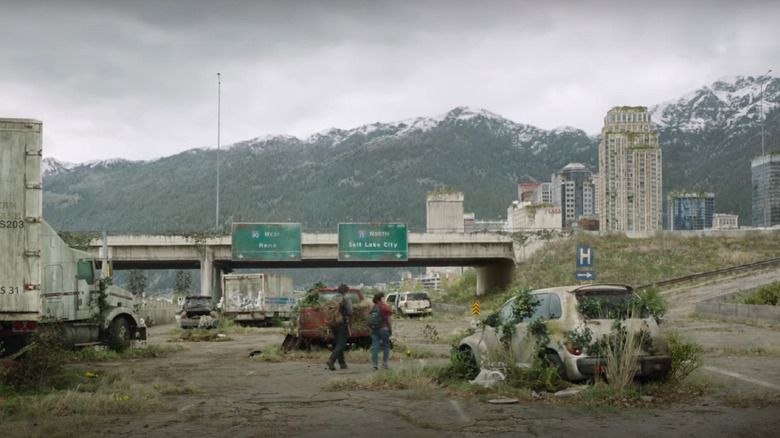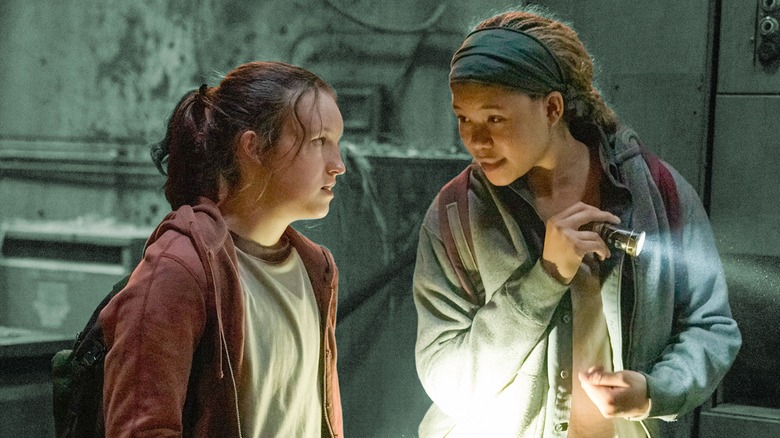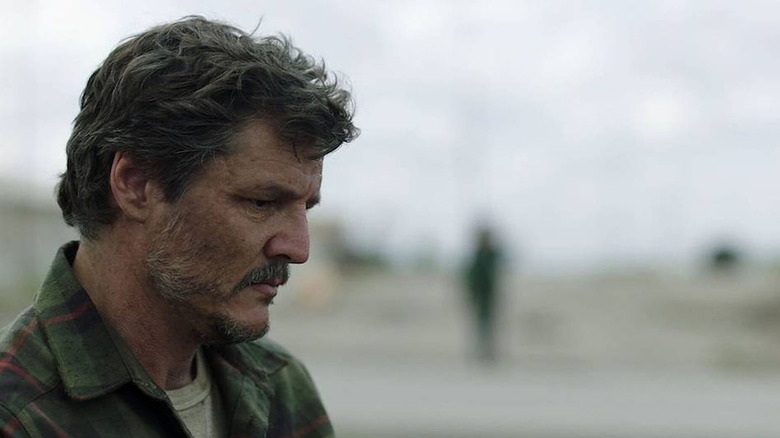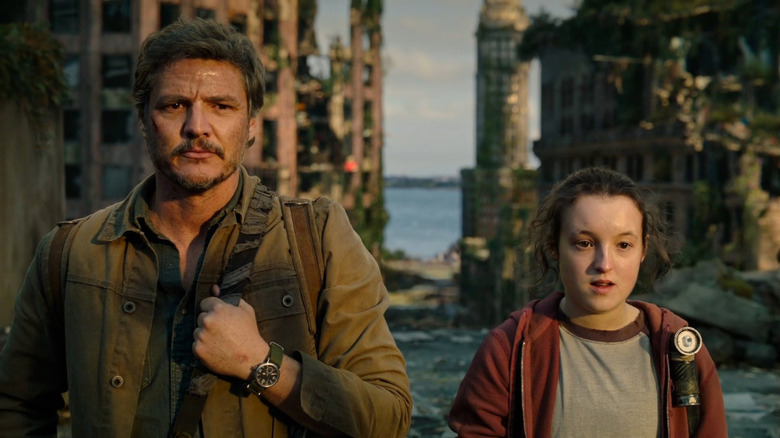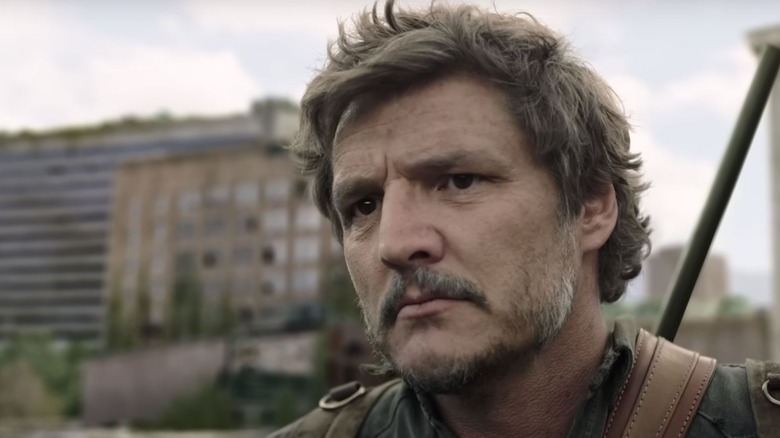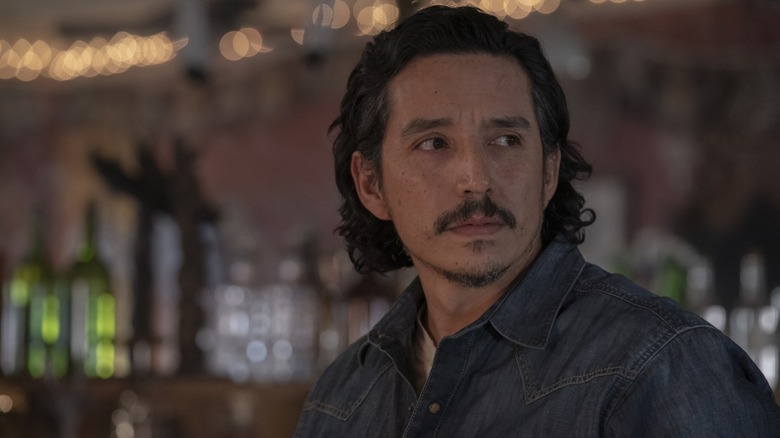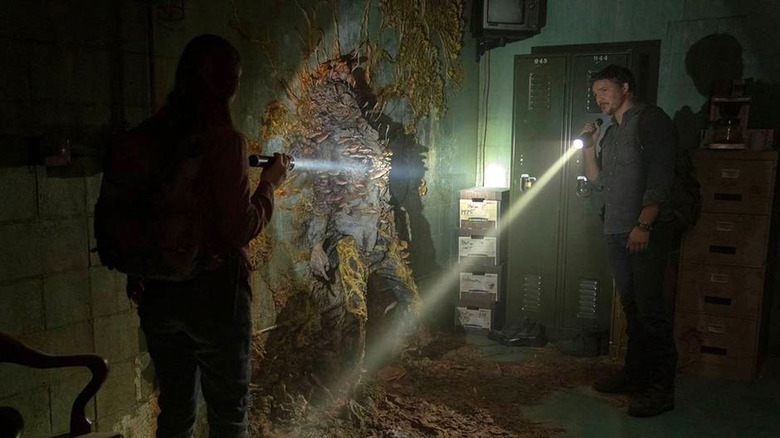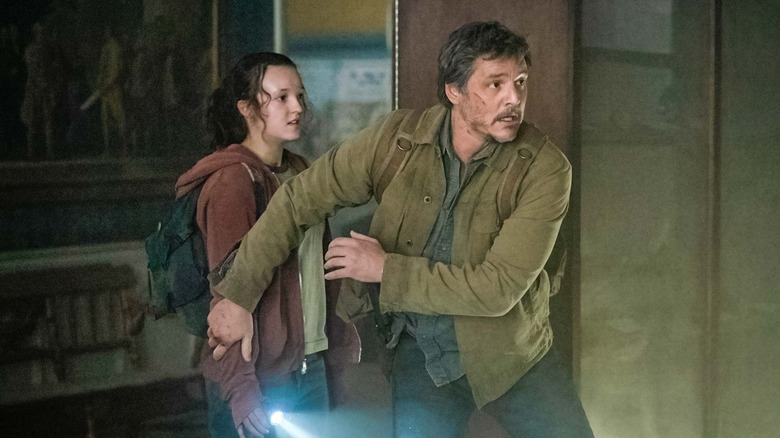The Ending Of The Last Of Us Season 1 Explained
So far, HBO's adaptation of the widely praised and best-selling video game "The Last of Us" has lived up to high expectations. The nine-episode first season managed to satisfy familiar gamers and uninitiated newcomers alike by mostly sticking to the original story and improving upon it whenever it diverged.
For example, the TV version of "The Last of Us" kicks off with a show-invented prologue in which John Hannah's Dr. Neuman opines to a talk show host how fungi pose a more dire threat to humans than viruses, especially in a rapidly warming climate. The chilling scene makes the apocalypse that's about to befall humanity all too plausible, and it perfectly sets up the tone for the story that's about to be told. On the other hand, the finale episode ends in about the same place as the original video game and strikes the same cautiously optimistic yet uneasy last beat. In between, Joel and Ellie's pasts and present unfold, pausing more than occasionally to show viewers glimpses of what life is like in a world where concepts like happiness or civility have been pushed to the very brink.
As was the case with the influential game, there's a lot of sub-text to unpack as our point-of-view characters, Joel Miller (Pedro Pascal) and Ellie Williams (Bella Ramsey), stave off the infected and (worse) their fellow desperate humans. "The Last of Us" is the type of show that plants what seem like benign seeds only to have them bloom into essential bits of plot and character development later on, often when the audience least expects it. This is what went down — and what it all really means — in Season 1.
Spoilers for "The Last of Us" Season 1 lie ahead.
How Ellie became immune
As enigmatic as Joel Miller is, the audience gets to know a lot about him in the series premiere. Ellie, on the other hand, remains a mystery for most of Season 1. Vital blanks about her don't get filled in until the final three episodes. Perhaps the most significant of these open questions is: Why is Ellie immune to Cordyceps? Viewers are also left wondering about her parentage, as well as her relationship with Marlene.
The finale opens with a harrowing extended pre-title sequence in which a pregnant woman is running for her life through the woods. She takes shelter in an abandoned building where it seems as though people should be waiting for her. They're not. The woman is in the final stages of labor when an infected breaches the door and thrusts itself upon her just as she's delivering her baby, whom she names Ellie. She manages to kill her attacker, but not before she's bit in the leg. To save her child from exposure, she hastily saws through her umbilical cord with the same knife with which she dispatched the infected runner.
Shortly thereafter, Marlene arrives. Ellie's mom assures her that she was bit after the cord was cut, but Marlene is skeptical, and we know it's a lie. It's implied that the exact moment of her birth rendered Ellie immune. Marlene promises to care for the baby before begrudgingly shooting and killing her friend. Presumably, she waits to see if infant Ellie is infected before stashing her with FEDRA where she can keep tabs on her. When Ellie proves to be resistant to Cordyceps, Marlene and the Fireflies take a renewed interest in this miracle child.
Why she goes on
Initially, Joel agrees to transport Ellie out West to a makeshift Firefly hospital in exchange for some sort of payment. As a bonus, it's his best move for getting out of the Boston QZ alive and his best hope of finding Tommy. But as he and his plucky cargo approach their final destination, it's painfully obvious that Joel no longer cares about his bounty. From Ellie's unusually flat affect, we can deduce that it's only just dawning on her and Joel what reaching their goal might mean. He floats the idea of forgoing their mission, suggesting they could instead return to Tommy's settlement and try to live as normal a life as possible. Ellie thanks him for protecting her and says she'd follow him anywhere (which leaves some important room for ambiguity later on), but insists they keep looking for the hospital.
Ellie says that after all she's done, she has to see their journey through to its end. She tells Joel that there's no going halfway with their mission, which could mean (along with her depressive, distracted state) that she has realized what will happen to her if they succeed. What's weighing on Ellie's conscience is two-fold. To survive, she's killed people and people have died on her behalf. Some of those people were innocents and loved ones. Ellie can't justify her morally compromised actions if they were only to buy herself some more time, even if that time is more meaningful now that she's partnered up with Joel. She's also working out the math about the value of her own life versus the value of a potential cure, which is a heck of an existential crisis for a teenager in the apocalypse to have on their shoulders.
What the Fireflies plan to do with her
Joel and Ellie don't find the hospital; the hospital finds them ... or, at least, the Fireflies who operate it do. After an explosion catches them off guard, Ellie is taken to a reclaimed pediatric surgery wing while Joel is knocked out cold with the butt of a rifle. When he comes to, Marlene is there to explain everything. To her credit, she tells the truth. The circumstances of Ellie's birth mean that her body releases chemical signals that tell Cordyceps she's already infected, much like a vaccine. A doctor affiliated with the Fireflies thinks he can reproduce that effect with Ellie's cells. A devastated Joel figures out that those cells will have to be harvested from her brain. Marlene acknowledges that she won't survive the surgery, but she tries to comfort Joel by assuring him that Ellie will die peacefully and unaware that she won't wake up from the medication she's been given.
In a scene that mirrors one from the game, Joel fights like heck to rescue Ellie, whom he swore to protect. Though his main motivation is surely to save the girl he's come to think of as a second daughter, he objects to the fact that Ellie wasn't given a choice in the matter. That's his rationale when he's confronted by Marlene in the parking garage. Since Ellie wasn't told about the procedure and since she didn't explicitly tell Joel she was willing to give her life for a possible cure (there are no guarantees the surgery or experimental treatments would work), he can't let the Fireflies go through with their plan.
What happened with Riley
The other mysteries surrounding Ellie have to do with her friend Riley and the extent to which Ellie has killed before. In the premiere, Marlene says that she's sorry about Riley, which is the audience's first clue that something went awry just prior to the series' main storyline. Early on in their journey, Ellie confides in Joel that she has had to defend herself with violence before. To that point, viewers had only seen her put an infected trapped in a basement out of its misery. The answers to both of these lingering questions come together in Episodes 7 and 9, though (thankfully) we don't have to watch the horrific incident play out on screen.
Riley was Ellie's best friend (and secret love interest) at the FEDRA school. When Riley was assigned sewage detail as a FEDRA-designated post-graduate career path, she defected to the Fireflies. Before she's shipped out on duty to another QZ, Riley plans a best-night-of-their-lives at the mall where the two experience some rare moments of levity and share their true feelings for each other. Riley intends to say goodbye, but Ellie (who's less hostile to FEDRA and unsure of how to feel about the Fireflies) asks her to stay. Best laid plans rarely work out in "The Last of Us," and Ellie and Riley are both bitten fighting off infected in the Halloween store. They decide to lose their minds together, but — as Ellie later recounts to Joel — this is when she discovers that she's immune. Riley succumbs but Ellie doesn't, leaving Ellie no choice but to kill her crush and best friend.
Who shot Joel
Throughout the series, Ellie and Joel make references to a scar on the right side of his head and to the fact that his hearing is diminished in that ear. The first version of the story he tells Ellie is simply that someone shot him and missed. The audience knows Joel has been through 20 harsh years following the Cordyceps outbreak and the death of his daughter, Sarah, so the fact that he's worse for the wear isn't surprising or particularly noteworthy. Viewers may have guessed that the wound is the result of an early shootout with authorities or an altercation with raiders or other smugglers at some point in between 2003 and the present.
However, in a slight departure from the game, Joel reveals to Ellie that he's the one who shot and missed. (The game hints that he's suicidal following Sarah's death.) This moment of extreme honesty and vulnerability on Joel's part comes as he and Ellie sneak through a long-defunct military medical encampment. Joel remembers how he convalesced in one after his self-inflicted gunshot wound. The memory serves to inform us about Joel's despair on day two of the outbreak as well as show us how quickly civilization fell apart when even the country's most extreme emergency response teams weren't up to the task.
If you or anyone you know is having suicidal thoughts, please call the National Suicide Prevention Lifeline by dialing 988 or by calling 1-800-273-TALK (8255).
Why Ellie and Joel finally open up to each other
For almost all of Season 1 of "The Last of Us," Joel and Ellie are keeping secrets from each other. She lets him and Tess in on her big secret — her immunity — pretty quickly, but both of their harder-hitting emotional baggage stays closed up until the finale. That's when Joel reveals the truth about Sarah and his gunshot wound and that's when Ellie finally tells Joel the real story about Riley and the first time she had to kill. Eventually, Joel even goes a step further and begins to openly discuss Sarah again in a way that he hasn't been able to bring himself to do since she died. Ellie offers that maybe time heals all wounds. She wonders aloud if what he means is that the passage of time enabled him to better cope with the loss of Sarah, which means Ellie may someday be able to better cope with the loss of Riley. But an emotional Joel replies "not time," indicating that he thinks his wounds are healing, but by other means.
He asks Ellie if she knows why he's getting all of this off his chest at that moment, then says he reckons she does. Ellie and Joel both know they might not see each other again on the other side of the Firefly hospital mission. When she wakes up from her medically induced sleep and they reconnect, what's really healing Joel and Ellie — as opposed to time — becomes clear. Yes, they've established trust on their months-long trek together, but it's the loving father-daughter relationship they've forged that's given them each something to live for again.
Why Joel lies
Season 1 of "The Last of Us" ends on a note that's both heartwarming and unsettling. Joel and Ellie look out over the pristine Wyoming landscape, about to head off into an uncertain but somewhat hopeful future together. Then, she asks him to swear that everything he said about the Fireflies was true. Though Joel and Ellie have been hiking for hours, only moments ago, viewers witnessed what really happened. The Fireflies fully intended to sacrifice Ellie — the only known person with immunity — in order to work toward a possible cure. They attempted to escort Joel out (though those two guards may have been about to kill him anyway), but Joel fought back, systematically gunning down Firefly after Firefly until he reached Ellie unconscious on her hospital bed. When Marlene tried to convince him to hand her over, he shot her with a gun hidden under Ellie's limp body.
Of course, that's not the story he tells a confused Ellie, still in her hospital gown. Joel explains that there were dozens like her and that the Fireflies were merely doing some tests to determine if a cure could be produced. When their immunity couldn't be replicated, they gave up on their research. Then, according to Joel, raiders swarmed the building, and he just barely got her out. He admits that people died, including Marlene. That Ellie turns away from Joel seems to symbolically indicate she knows he's made up a story to shield her from a much worse reality. He swears to his version, which is an outright lie, because his new personal mission is protecting Ellie at all costs.
Who we'll see again
In both the game and the series, players and viewers encounter compelling new characters, then leave them behind as quickly as they met. These characters were already remarkably well-drawn within the context of a video game, but the HBO show delves deeper into their backstories and adds new personality traits that only enhance what fans appreciate about them. Some of the best episodes of "The Last of Us" feature characters that only appear in one or two episodes, which, in a way, makes those installments all the more special. In particular, Episode 3's 16-year relationship between Bill and Frank and Episode 5's real-time escape with Henry and Sam are two of the show's high points. As fantastic as Nick Offerman, Murray Bartlett, Lamar Johnson, and Keivonn Woodard all are, it's extremely unlikely we'll see them again. Same goes for Melanie Lynskey's Kathleen and Scott Shepherd's David, who both loomed terrifyingly large over an episode then swiftly met their gory end.
But not every deceased "The Last of Us" character is necessarily gone for good. So far, the series has frequently employed flashbacks to illustrate events from the past that are alluded to in dialogue from the present timeline. Characters like Sarah, Tess, Marlene, and Riley, who factor more directly into Joel and Ellie's lives (and thus the main storyline) could reappear in such scenes going forward. A safer bet is that characters who aren't dead yet will play larger roles in Season 2. That includes Tommy and his wife Maria, and it could even include "The Last of Us" characters who currently appear to be little more than scene filler.
What the title means
"The Last of Us" has been getting acclaim for bringing a prestige TV sensibility to a video game adaptation for perhaps the first time. While there are plenty of infected (don't call them zombies) jump scares and first-person shooter POV shots, what really stands out about the series is how contemplative it is in its depiction of morality and relationships in a post-apocalyptic world. "The Last of Us" is, on the surface, about a catastrophic Cordyceps outbreak, but it's really about what happens to humanity under those circumstances. There are numerous multilayered elements to both the game and the show — even the title has two meanings.
"The Last of Us" literally refers to the survivors of the Cordyceps fungus that wiped out a huge percentage of the global population. Those survivors have also lived through the collapse of society as they knew it. In that way, "The Last of Us" refers to what remains of civilization. There are no longer factories, restaurants, shopping malls, or airplanes. Twenty years on, some groups are descending into chaos while others are just starting the process of rebuilding what can barely be called towns. But there are good people who will supply teenage girls with sanitary products or who will share a meal and a bottle of wine with a stranger. That brings us to yet another interpretation of the title. "The Last of Us" also refers to what's left of an individual person's humanity when they don't necessarily have anything left to live for or when they've had to seriously compromise their beliefs in order to persist. The game and the show are equally interested in the idea of "The Last of Us" on visceral, cerebral, and spiritual levels.
What to expect from Season 2
Since "The Last of Us" is based on a video game, there will always be more problems for Joel and Ellie to have to solve or shoot their way out of. But conflict is inherent to all stories — especially post-apocalyptic survival stories — so that'd be the case whether or not the source material involved looting for and firing weapons at mushroom undead. Yet, for such a dark tale, "The Last of Us" has given audiences some truly beautiful moments of reprieve (Bill and Frank's better days, the free-ranging giraffes), and it seems like Season 2 will start off with our now deeply bonded protagonists getting some well-earned downtime.
But players of the more divisive "The Last of Us Part II" know viewers shouldn't rest too easy. It will be interesting to see how show creators Craig Mazin and Neil Druckmann handle the time jump in between the first and second installments of the game, which flashes forward approximately five years. Mazin and Druckmann also have to decide how faithful the second season of the HBO series should be to the game sequel, which includes some huge twists and more overt socio-political sentiments that didn't necessarily go over well with a vocal portion of the fandom. Nevertheless, expect Druckmann (who authored and co-directed the video games) to approach "The Last of Us" Season 2 the same way he approached Season 1; he and the rest of the cast and crew will likely stick to his original artistic and philosophical vision without being too committed to strict recreation.
